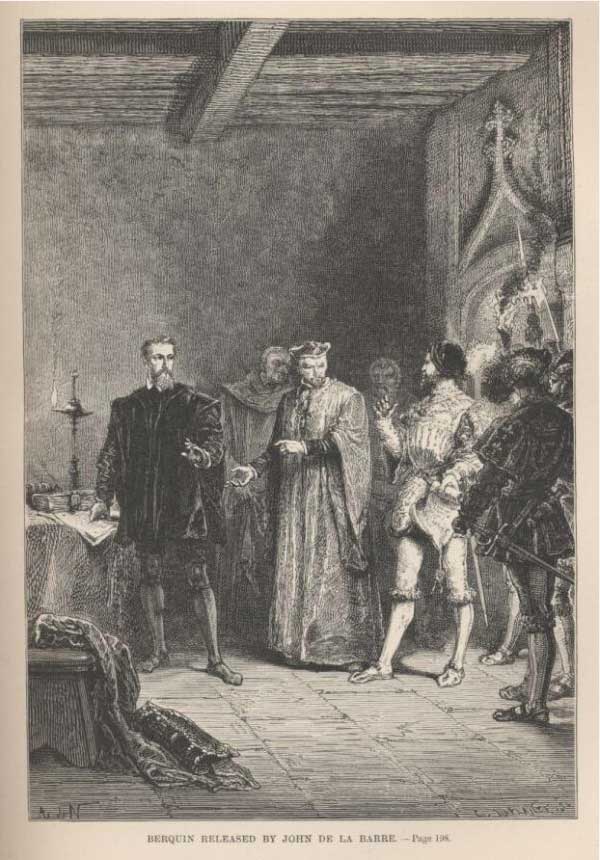Louis de Berquin on:
[Wikipedia]
[Google]
[Amazon]
Louis de Berquin (c. 1490 – 17 April 1529) was a French lawyer, civil servant, linguist, 
lapidary
Lapidary (from the Latin ) is the practice of shaping stone, minerals, or gemstones into decorative items such as cabochons, engraved gems (including cameos), and faceted designs. A person who practices lapidary is known as a lapidarist. A lap ...
, and Protestant reformer in the 16th century. He was burned at the stake as a heretic in April 1529 for refusing to recant his beliefs.

Life and work
Berquin was born of noble family around 1490 inVieux-Berquin
Vieux-Berquin (; nl, Oud-Berkijn) is a commune in the Nord department in northern France.
Heraldry
See also
*Communes of the Nord department
The following is a list of the 648 communes of the Nord department of the French Republic.
The c ...
. Coming into contact with Christian humanists such as Erasmus
Desiderius Erasmus Roterodamus (; ; English: Erasmus of Rotterdam or Erasmus;''Erasmus'' was his baptismal name, given after St. Erasmus of Formiae. ''Desiderius'' was an adopted additional name, which he used from 1496. The ''Roterodamus'' w ...
and Jacques Lefèvre d'Étaples
Jacques Lefèvre d'Étaples ( Latinized as Jacobus Faber Stapulensis; c. 1455 – c. 1536) was a French theologian and a leading figure in French humanism. He was a precursor of the Protestant movement in France. The "d'Étaples" was not part of ...
he began to study the Bible for himself and to advocate reform of the French Catholic Church from within. He desired to free France from the power of the pope. His writings aroused fierce opposition among traditional scholars. However, King Francis I
Francis I (french: François Ier; frm, Francoys; 12 September 1494 – 31 March 1547) was King of France from 1515 until his death in 1547. He was the son of Charles, Count of Angoulême, and Louise of Savoy. He succeeded his first cousin once ...
and his sister Marguerite of Valois
Margaret of Valois (french: Marguerite, 14 May 1553 – 27 March 1615), popularly known as La Reine Margot, was a French princess of the Valois dynasty who became Queen of Navarre by marriage to Henry III of Navarre and then also Queen of France a ...
intervened in his behalf.Guizot, M. ''Popular History of France from the Earliest Times,'' trans. Robert Black. Boston: Estes & Lauriat, ca. 1869.
Marguerite especially defended him, writing to the constable, Anne de Montmorency
Anne, Duke of Montmorency, Honorary Knight of the Garter (15 March 1493, Chantilly, Oise12 November 1567, Paris) was a French soldier, statesman and diplomat. He became Marshal of France and Constable of France and served five kings.
Early lif ...
after Berquin was released from one arrest, "I thank you for the pleasure you have afforded me in the matter of poor Berquin whom I esteem as much as if he were myself; and so you may say you have delivered me from prison, since I consider in that light the favor done me." In a letter to Erasmus
Desiderius Erasmus Roterodamus (; ; English: Erasmus of Rotterdam or Erasmus;''Erasmus'' was his baptismal name, given after St. Erasmus of Formiae. ''Desiderius'' was an adopted additional name, which he used from 1496. The ''Roterodamus'' w ...
, Berquin accused the divinity professors of Sorbonne
Sorbonne may refer to:
* Sorbonne (building), historic building in Paris, which housed the University of Paris and is now shared among multiple universities.
*the University of Paris (c. 1150 – 1970)
*one of its components or linked institution, ...
of impiety. On the 16 of April, 1529, the French Parliament condemned him to watch as his books were burned, to have his tongue pierced, and then to be imprisoned without reading material for life. When Berquin refused, even by silence, to condone the condemnation of truth, he was returned to prison. The next day, 17 April 1529, he was brought out and burned at the stake. All his original works are lost, only a few of his Erasmus
Desiderius Erasmus Roterodamus (; ; English: Erasmus of Rotterdam or Erasmus;''Erasmus'' was his baptismal name, given after St. Erasmus of Formiae. ''Desiderius'' was an adopted additional name, which he used from 1496. The ''Roterodamus'' w ...
translations remain.
A Protestant controversialist has written:
:Louis de Berquin was of noble birth. A brave and courtly knight, he was devoted to study, polished in manners, and of blameless morals. 'He was,' says a writer, 'a great follower of the papistical constitutions, and a great hearer of masses and sermons;... and he crowned all his other virtues by holding Lutheranism in special abhorrence.' But, like so many others, providentially guided to the Bible, he was amazed to find there 'not the doctrines of Rome, but the doctrines of Luther.' Henceforth he gave himself with entire devotion to the cause of the gospel.White, Ellen G. "The French Reformation", In ''The Great Controversy'', 215.3. Pacific Press Publishing Association, 1911.
:
References
1490 births 1529 deaths People from Nord (French department) 16th-century French lawyers French civil servants Linguists from France {{France-hist-stub